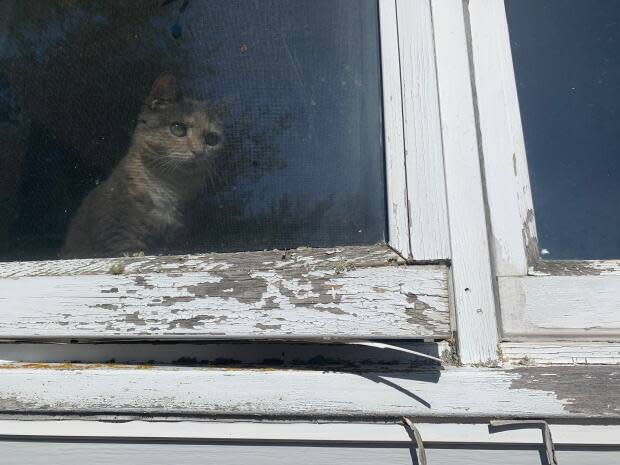Senior desperate for new windows ready to ditch prescriptions after emergency aid denied
Seventy-six-year-old Edith Blacklock takes pride in her neat bungalow, surrounded by plants and solar-powered lights. But when she turned to the provincial government to help her replace her home's leaky, drafty windows she said she was turned down.
She doesn't know what to do.
Blacklock lives in her Timbre River home, about 38 kilometres northwest of Sackville, with her dog Harley, a cockatiel and her cat. Some of her six kids, 14 grandchildren and 19 great-grandchildren live nearby.
Her modest income covers her basic needs, but she can't stretch it thin enough to cover house repairs.
'it's either that or freeze to death'
"My windows are literally — they're held together with rope," said Blacklock.
The 10 wooden windows on her home are rotting and need to be replaced.
"I do not have a choice right now, it's either that or freeze to death this winter," she said.

But Blacklock said replacing the windows will cost nearly $9,000, more money than she has.
Looking for help, she turned to Pam Van Egmond.
Egmond helps seniors navigate Nursing Homes Without Walls, a pilot project funded by the federal and provincial governments. Its mandate: to help seniors stay in their homes for as long as they want to, for as long as it's safe. It's part of a research project by Suzanne Dupuis-Blanchard at the Université de Moncton.
Van Egmond said the group has about 170 members, all seniors who live in rural southeastern New Brunswick.
"We take them on as clients and we assist them with their health needs and also with their homes," said Van Egmond.
"If there's any safety requirements that are necessary, we stay in touch with them a lot."
She said a number of programs are designed to help seniors with the expense of home repair, but the seniors often don't know about them. And accessing the money can be difficult, especially for seniors not used to dealing with bureaucracy.
'You're always running to find something'
"There's 12 forms that have to be mailed," said Van Egmond.
With Van Egmond's help, Blacklock was able to get her information together, including her late husband's death certificate issued in 2011.
"They make it so hard with all the paperwork, you're always running to find something," said Blacklock.
She applied to the province's Emergency Repair Program in June. Blacklock said an inspector came to look at her home and said she would qualify for emergency repairs.
Then she spoke to someone else at the Department of Social Development, who told her she wouldn't be getting a grant but might be eligible for a loan to cover half the cost whild Social Development would cover the rest.
Blacklock said even half of $9,000 is more than she has, but if she's offered a loan she'll take it and find the money.
Sleepless nights
"I am on on seven different prescriptions so I can cut something at least," said Blacklock.
She said her doctor has warned her against this, but she doesn't know what else to do.
"I wouldn't have done it, wouldn't have done it," said Blacklock if she'd known how hard the process would be.
"It's too stressful."

Van Egmond said it's not unusual to hear from seniors about their sleepless nights when applying to government programs, especially when it's for an emergency repair.
Blacklock wants to stay in her home because it's where she is most comfortable, surrounded by her pets. And leaving would mean selling her home, something she is dead set against. One of the last things her husband asked of her was to make sure the house was passed on to their children.
Social Development responds
Abigail McCarthy, communications officer with the Department of Social Development said she can't comment on specific cases for privacy issues, but "each applicant for the program is assessed on a case-by-case basis."
She said a program has been available to seniors since 2017 called the Seniors Minor Home Repair Program. In 2018-19, $1.6 million was spent on the program, which translated to assisting 1,580 households.
This year, 43 people have applied, while 23 people were accepted in to the program with about $300,000 spent.


